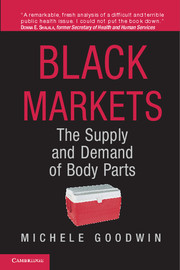Book contents
- Frontmatter
- Dedication
- Epigraph
- Contents
- Miscellaneous Frontmatter
- Preface
- Acknowledgments
- BLACK MARKETS
- PART ONE UNDERSTANDING THE STRAIN ON ALTRUISM
- 2 Institutional Supply, Demand, and Legitimacy
- 3 Nuances, Judicial Authority, and the Legal Limits of Altruism
- 4 Getting the Organ You Want
- PART TWO LEGAL FRAMEWORKS AND ALTERNATIVES
- PART THREE CRITIQUING THE SLAVERY AND BLACK BODY MARKET COMPARISON
- Notes
- Bibliography
- Index
2 - Institutional Supply, Demand, and Legitimacy
from PART ONE - UNDERSTANDING THE STRAIN ON ALTRUISM
Published online by Cambridge University Press: 14 September 2019
- Frontmatter
- Dedication
- Epigraph
- Contents
- Miscellaneous Frontmatter
- Preface
- Acknowledgments
- BLACK MARKETS
- PART ONE UNDERSTANDING THE STRAIN ON ALTRUISM
- 2 Institutional Supply, Demand, and Legitimacy
- 3 Nuances, Judicial Authority, and the Legal Limits of Altruism
- 4 Getting the Organ You Want
- PART TWO LEGAL FRAMEWORKS AND ALTERNATIVES
- PART THREE CRITIQUING THE SLAVERY AND BLACK BODY MARKET COMPARISON
- Notes
- Bibliography
- Index
Summary
INTRODUCTION
In Chapter 2, I analyze the limits of altruism and the “gift” model concept. It argues that we should rethink our exclusive relationship with altruism. Chapter 2 uses empirical data to explore institutional choice and why it seems we are wedded to particular institutional models at certain times. The “ethic” of volunteerism is what drives our altruistic procurement system. Indeed, the strategic information campaigns, promoting donation as a courageous act that is so valuable that it is priceless, transformed the language of organ donation, but has not reached its mark to increase participation from potential donors. In doing so, marketing experts created a metaphor trapped in its own cloak or rhetoric. The “gift of life” is a fallacy according to Siminoff and Chillag. Organ donation, according to the authors, is more like creating a fettered “creditor-debtor” relationship with the inability of donors or recipients to ever fully come to closure with the transaction. The issues examined in Chapter 2 extend beyond donors and recipients, and thereby involve questions of equitable redistribution and sharing, faith, and confidence. Fully comprehending the strains on altruism requires situating the model within this broader social context and exploring its physical capacity to accommodate medical needs.
This chapter begins by examining institutional efficiency and legitimacy. What are the goals of our procurement process and who will evaluate whether those goals are met? What are the pitfalls or promises of having only one institution weigh in on that type of decision making? In particular, this section begins with the question of medical trust in government-sponsored relationships. It argues that a legacy of pernicious medicine in the United States must come to light and perhaps in the process of acknowledgment, trust might be restored. The next section provides an empirical overview of organ demand in the United States over a 15-year period, from 1990 to 2005, utilizing data collected from the UNOS (however, the data for 2005 reflects available information as of July 2005). This chapter concludes by examining faith and confidence in the altruistic system, particularly from the focus of African Americans. Data collected from a qualitative study involving African Americans in Chicago help to illume their hesitation, fears, reluctance, and lack of confidence in the current procurement model. Their concerns are complex, residing not exclusively in the procurement process. They also expressed deep misgivings about how organs are distributed and government involvement.
- Type
- Chapter
- Information
- Black MarketsThe Supply and Demand of Body Parts, pp. 27 - 56Publisher: Cambridge University PressPrint publication year: 2006



